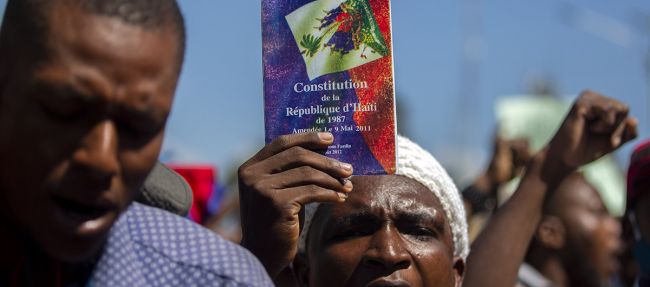Democracy in danger in Haiti: education unions mobilise
The country is sinking into violence, under the indifferent gaze of the international community. EI is today launching a solidarity campaign with its affiliates in Haiti.
For many months, Haiti has been threatened by widespread chaos, marked by the violence of armed gangs and the questioning of democratic foundations by the highest authority in the country.
Attacks on democracy are consecutive
Despite his presidential mandate ending on February 7, 2021, Jovenel Moïse has decided to hang on to power for one more year. While Parliament has ceased to function for over a year due to lack of elections, the country is now governed by decree. Jovenel Moïse also plans to hold a referendum aimed at changing the Constitution, even though this is explicitly prohibited by the country's Constitution. Faced with the proliferation of these authoritarian abuses, many trade unions and civil society organisations fear a concentration of powers in the hands of the President of the Republic. They believe that the risk of seeing Haiti fall once again into dictatorship is real and regret the far too timid reactions of the international community, and in particular of the representatives of the Core Group*.
Widespread violence sows chaos
Violence is now pervasive in Haiti. All unions and human rights organisations have seen the same thing as the use of armed gangs is enacted by the authorities. The kidnappings, assassinations and rapes perpetrated by these gangs are increasing alarmingly.
This widespread violence paralyses the country's activities and severely restricts the fundamental rights and freedoms of students, teachers, trade unionists and the entire Haitian population. The increase in the price of basic foodstuffs is also leading to a deterioration in the living conditions of many people, in one of the countries already among the poorest on the planet.
Significant impact on the right to education
Like all EI affiliates in Haiti, René Prévil Joseph, Secretary General of the Fédération Nationale des Travailleurs en Education et en Culture (FENATEC), is seriously concerned about the impact of the security situation on children, teachers and on the right to education. He describes: “Children are exposed to gang violence on their way to school, one child has even been kidnapped in front of his classmates at the entrance to his school. Schools are closed in some areas for security reasons." In addition, to conclude: "All these facts constitute a brake on the socio-economic development of Haiti, which must necessarily go through education and training."
Magalie Georges, Secretary General of Konfederasyon Nasyonal Anseyan Dayiti (CNEH), makes the same observation: “School principals are victims of blackmail. The economic situation deprives educational personnel of the necessary resources that can cover the costs of schooling and transport for their children. Teachers become poorer; those in the private education sector are deprived of their salary when schools are closed."
Trade unions are prevented from functioning
The current political and security situation strongly affects the free exercise of essential trade union rights. Roadblocks set up by armed gangs make travel around the country extremely dangerous and difficult. Union officials are no longer able to travel to the provinces to collect membership dues. In addition, union leaders continue to be the target of punitive measures, including arbitrary transfers, preventing them from carrying out their legitimate activities.
In August 2020, the Minister of National Education and Vocational Training Agénor Cadet arbitrarily transferred two union officials who are EI affiliates, Magalie Georges and Georges Wilbert Franck. Despite the massive mobilisation of Haitian teachers, on strike throughout the month of September 2020, and the actions taken by EI and its affiliates, the minister never reversed his decision. “Even today the Minister of National Education continues to violate the rights of trade unionists by transferring them to very remote areas. With these new waves of repression, the bridges are completely cut between the Ministry and all unions", comments Georges Wilbert Franck, Coordinator of the l’Union Nationale des Normaliens/Normaliennes et Educateurs/Educatrices d’Haïti (UNNOEH).
Trade unions mobilise for democracy
Without being able to dialogue with the Minister of Education, EI affiliates had to reconsider their strategy. Education unions have joined forces with civil society and human rights organisations to demand respect for democratic values and the rights and freedoms of the Haitian people.
"Faced with such barbarism which currently reigns in Haiti, the trade union sector had no other choice but to engage in resistance in an attempt to reconquer the democratic spaces essential to the exercise of fundamental freedoms", explains Georges Wilbert Franck.
Several large-scale strikes and demonstrations have been organised since the start of the year, but continued mobilisation is made difficult by the security situation. In addition, EI affiliates and civil society organisations believe that mobilisation and actions at the national level will not be enough to end the attacks on democracy. They are calling for a much stronger reaction from the international community, in particular from members of the Core Group, to condemn Jovenel Moïse's retention in power and dictatorial abuses.
Call for solidarity from EI
Education International is launching a campaign today to strengthen support for its Haitian affiliates in their struggle for democracy, the right to education and freedom of association in Haiti. EI will mobilise on several fronts with all of its affiliates around the world, in particular by strengthening its action with United Nations bodies, stepping up the pressure on the Haitian authorities and the countries of the Core Group, as well as development cooperation actions in support of its members.

[Thu, 29 Apr 2021 11:21:00 +0000] | DIGG THIS
